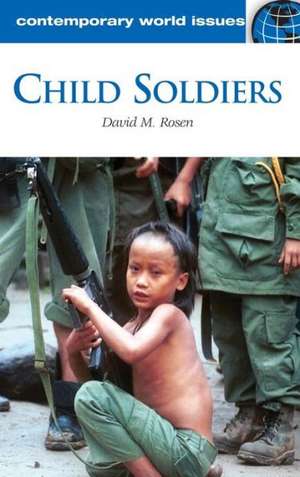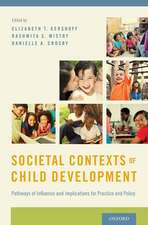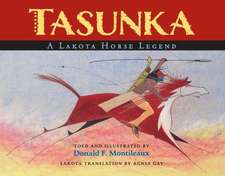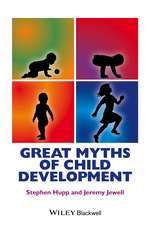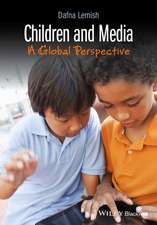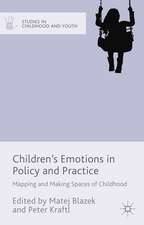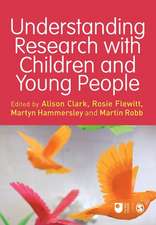Child Soldiers: A Reference Handbook: Contemporary World Issues
Autor David M. Rosenen Limba Engleză Hardback – 22 apr 2012 – vârsta până la 17 ani
Din seria Contemporary World Issues
- 54%
 Preț: 234.35 lei
Preț: 234.35 lei - 42%
 Preț: 275.73 lei
Preț: 275.73 lei - 39%
 Preț: 276.59 lei
Preț: 276.59 lei - 42%
 Preț: 275.44 lei
Preț: 275.44 lei - 42%
 Preț: 276.86 lei
Preț: 276.86 lei - 42%
 Preț: 276.29 lei
Preț: 276.29 lei - 42%
 Preț: 275.73 lei
Preț: 275.73 lei - 41%
 Preț: 281.41 lei
Preț: 281.41 lei - 42%
 Preț: 251.90 lei
Preț: 251.90 lei - 52%
 Preț: 229.98 lei
Preț: 229.98 lei - 42%
 Preț: 228.67 lei
Preț: 228.67 lei - 42%
 Preț: 276.78 lei
Preț: 276.78 lei - 48%
 Preț: 252.86 lei
Preț: 252.86 lei - 42%
 Preț: 276.96 lei
Preț: 276.96 lei - 42%
 Preț: 278.86 lei
Preț: 278.86 lei -
 Preț: 275.92 lei
Preț: 275.92 lei - 52%
 Preț: 229.23 lei
Preț: 229.23 lei - 42%
 Preț: 227.91 lei
Preț: 227.91 lei - 42%
 Preț: 277.45 lei
Preț: 277.45 lei - 42%
 Preț: 276.86 lei
Preț: 276.86 lei - 42%
 Preț: 290.89 lei
Preț: 290.89 lei - 42%
 Preț: 228.75 lei
Preț: 228.75 lei - 42%
 Preț: 277.71 lei
Preț: 277.71 lei - 42%
 Preț: 228.96 lei
Preț: 228.96 lei - 52%
 Preț: 229.33 lei
Preț: 229.33 lei - 41%
 Preț: 230.39 lei
Preț: 230.39 lei - 42%
 Preț: 228.86 lei
Preț: 228.86 lei - 42%
 Preț: 276.86 lei
Preț: 276.86 lei - 42%
 Preț: 229.33 lei
Preț: 229.33 lei - 42%
 Preț: 277.54 lei
Preț: 277.54 lei - 42%
 Preț: 252.08 lei
Preț: 252.08 lei - 53%
 Preț: 227.73 lei
Preț: 227.73 lei - 41%
 Preț: 230.65 lei
Preț: 230.65 lei - 42%
 Preț: 252.20 lei
Preț: 252.20 lei - 42%
 Preț: 291.34 lei
Preț: 291.34 lei - 42%
 Preț: 277.71 lei
Preț: 277.71 lei - 42%
 Preț: 251.35 lei
Preț: 251.35 lei - 46%
 Preț: 290.98 lei
Preț: 290.98 lei - 42%
 Preț: 228.38 lei
Preț: 228.38 lei - 42%
 Preț: 229.80 lei
Preț: 229.80 lei - 49%
 Preț: 276.68 lei
Preț: 276.68 lei - 42%
 Preț: 291.93 lei
Preț: 291.93 lei - 42%
 Preț: 227.24 lei
Preț: 227.24 lei - 42%
 Preț: 290.41 lei
Preț: 290.41 lei - 49%
 Preț: 277.04 lei
Preț: 277.04 lei - 42%
 Preț: 229.33 lei
Preț: 229.33 lei - 42%
 Preț: 252.20 lei
Preț: 252.20 lei - 42%
 Preț: 227.91 lei
Preț: 227.91 lei - 42%
 Preț: 228.96 lei
Preț: 228.96 lei - 42%
 Preț: 227.82 lei
Preț: 227.82 lei
Preț: 230.39 lei
Preț vechi: 393.51 lei
-41% Nou
Puncte Express: 346
Preț estimativ în valută:
44.09€ • 46.24$ • 36.70£
44.09€ • 46.24$ • 36.70£
Carte tipărită la comandă
Livrare economică 01-15 aprilie
Preluare comenzi: 021 569.72.76
Specificații
ISBN-13: 9781598845266
ISBN-10: 1598845268
Pagini: 344
Dimensiuni: 152 x 229 x 30 mm
Greutate: 0.64 kg
Ediția:New.
Editura: Bloomsbury Publishing
Colecția ABC-CLIO
Seria Contemporary World Issues
Locul publicării:New York, United States
ISBN-10: 1598845268
Pagini: 344
Dimensiuni: 152 x 229 x 30 mm
Greutate: 0.64 kg
Ediția:New.
Editura: Bloomsbury Publishing
Colecția ABC-CLIO
Seria Contemporary World Issues
Locul publicării:New York, United States
Caracteristici
Biographical sketches of famous child soldiers and key figures in the effort to ban the use of child soldiers
Notă biografică
David M. Rosen is professor of anthropology and law at Fairleigh Dickinson University, NJ. His published works include Armies of the Young: Child Soldiers in War and Terrorism.
Cuprins
Preface1 Background and HistoryDefining the "Problem" of Child SoldiersWhere Are the Child Soldiers?A New International Problem but a Very Old SituationCurbing Child Recruitment: The Problem of Armed GroupsUsing Law to End the Use of Child SoldiersFirst Steps: The Geneva ConventionsProtecting Child Combatants: The 1977 Additional ProtocolsThe Rome Statute: Setting Equal StandardsChild Soldiers and International Customary LawWho Is a Child?Straight-18: The Human Rights Position in the Convention on the Rights of the ChildMoving toward Age 18International Treaties, Children's Rights, and the Definition of ChildhoodCommon Assumptions about Child SoldiersAssumption 1: Children Are VulnerableAssumption 2: All Child Soldiers Are Abused and ExploitedAssumption 3: Child Soldiers Are a Product of the New Barbarism of WarThe Role of Humanitarian Groups and "Civil Society,"References2 Problems, Controversies, and SolutionsEnding the Use of Child Soldiers: Problems and SolutionsThe Issue of Exceptions: Wars of National LiberationThe Complexities of Treaties and International LawWhen Treaties Bind NonsignatoriesUsing Customary Law: The Case of Sierra LeoneCaptured Child CombatantsChildren's Rights and the Straight-18 PositionInventing a Universal Definition of ChildhoodHuman Rights and the Realities of International LawWho Is a Child?International Law and Local Understandings of ChildhoodThe Boundaries between Childhood and AdulthoodCivil Society and Social ChangeChild Soldiers in Cross-Cultural and Historical PerspectiveWho Is a Child Soldier? Expanding the DefinitionPutting Child Recruiters on TrialThe ICC: Cases from the Congo and UgandaThe Special Court for Sierra Leone: The Meaning of RecruitmentVoluntary Enlistment or Forcible Recruitment?Local Customs, International InterpretationsWhat Constitutes Enlistment?The Implications of an Expanded Definition of EnlistmentPutting Children on TrialAge and the Culpability of ChildrenWrestling with Children's CulpabilityAge and Culpability in Domestic CourtsDDR: Disarming, Demobilizing, and Reintegrating Child SoldiersReferences3 Special U.S. IssuesGrappling with the Child Soldier Problem: U.S. Achievements and FailuresThe Recruitment of Child SoldiersThe United States and the Optional ProtocolU.S. Domestic LegislationCompliance with Domestic LegislationThe Protection of Child Soldiers: The United States and the Treatment of Child CaptivesRules for the Treatment of DetaineesUnlawful Combatants and the War against TerrorDetaining Child SoldiersThe Treatment of Child Soldiers: The Legal ContextPresidential OrdersLegal ChallengesPutting Child Soldiers on Trial: U.S. Military CommissionsThe Case of Mohammed Jawad: Tortured for SportOmar Khadr: The First Child Soldier Tried since World War IIConclusionReferences4 Chronology5 Biographical SketchesChild Soldiersal-Akhras, AyatArafat, YasserBeah, IshmaelBevistein, Abraham (Aby)Casabianca, GiancomoClem, John LincolnCornwall, John TraversDayan, MosheJackson, AndrewJal, EmmanuelJawad, MohammedJoan of ArcKhadr, OmarLadd, Luther C.Lucas, JackMackenzie, ClarenceMurphy, AudieOkafor, BenSoldaderasTsam, Herzl YanklTungwar, LamYurlova, MarinaProminent Recruiters of Child SoldiersDyilo, Thomas LubangaFarhat, Maryam Mohammad YousifKony, JosephTaylor, Charles GhankayKey Figures in the Movement to End the Use of Child SoldiersBecker, JoCoomaraswamy, RadhikaDellaire, RomeoMachel, GracaOtunnu, Olara A.6 Data and DocumentsData OverviewInternational TreatiesArticles Relating to the Protection of Children from the Fourth Geneva Convention Relative to the Protection of Civilian Persons in Time of War, 12 August 19491949 Geneva Conventions Common Article 3Selections from the Third Convention Relative to the Treatment of Prisoners of War, Geneva, 12 August 1949Protocol Additional to the Geneva Conventions of 12 August 1949, and Relating to the Protection of Victims of International Armed Conflicts (Protocol I), 8 June 1977Protocol Additional to the Geneva Conventions of 12 August 1949, and Relating to the Protection of Victims of Non-International Armed Conflicts (Protocol II), 8 June 1977Articles Relating to Child Soldiers from the Convention on the Rights of the Child (1989)Optional Protocol to the Convention on the Rights of the Child on the Involvement of Children in Armed Conflict (2000)Articles Relating to Child Soldiers from the Rome Statute of the International Criminal Court (1998)Statute of the Special Court for Sierra Leone (2000)African Charter on the Rights and Welfare of the Child (1990)Cape Town Principle and Best Practice on the Prevention of Recruitment of Children into the Armed Forces and Demobilization and Social Integration of Child Soldiers in Africa (1997)International Labour Organization Convention 182 Concerning the Prohibition and Immediate Action for the Elimination of the Worst Forms of Child Labour (1999)U.S. LegislationThe Child Soldier Prevention Act of 2008The Child Soldier Accountability Act of 2008Human Rights Enforcement Act of 20097 Directory of Organizations8 ResourcesChild Soldiers: General StudiesChild Soldiers: Studies of Children at WarPolicy and AdvocacyHuman Rights ReportsDisarmament, Demobilization, and ReintegrationChild Soldiers in HistoryChild Soldiers and International Law: Key TreatiesInternational Criminal TribunalsChild Soldiers: Legal AnalysesAutobiographies and BiographiesMemorial BooksChild Soldiers in FictionFilm and VideoPodcastsGlossaryIndexAbout the Author
Recenzii
This well-written book provides good coverage of its subject, offering a chronology, historical background, and detailed material on legislation and on organizations that are trying to make a difference.
This title from ABC-CLIO's Contemporary World Issues series addresses a vital, pressing global concern. . . . The writing is clear, and the work is well organized. It is current through 2011 and fulfills the goal of being useful for students, researchers, and the general public. For most collections.
This title from ABC-CLIO's Contemporary World Issues series addresses a vital, pressing global concern. . . . The writing is clear, and the work is well organized. It is current through 2011 and fulfills the goal of being useful for students, researchers, and the general public. For most collections.
